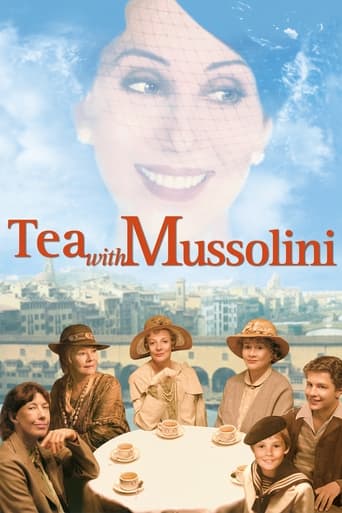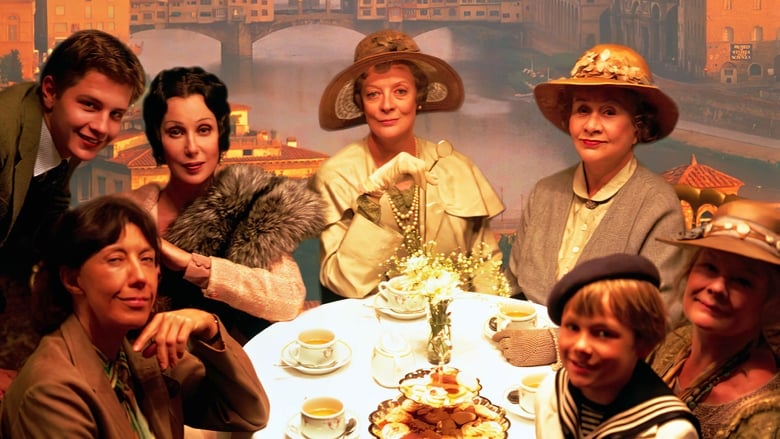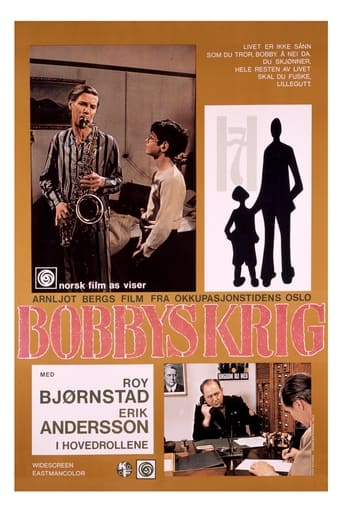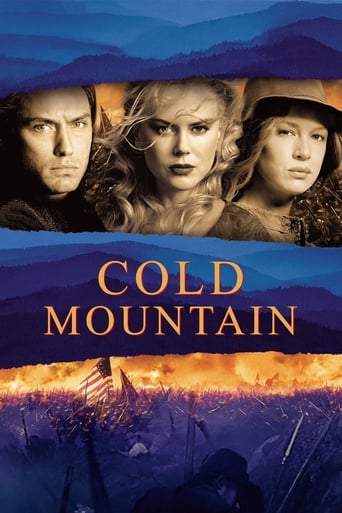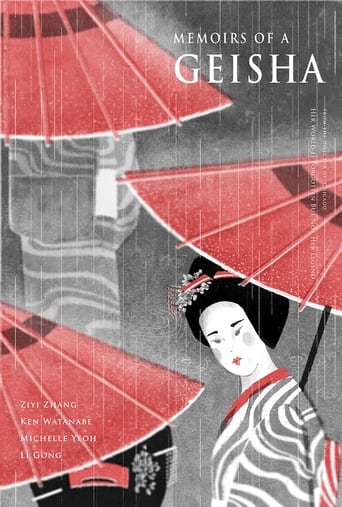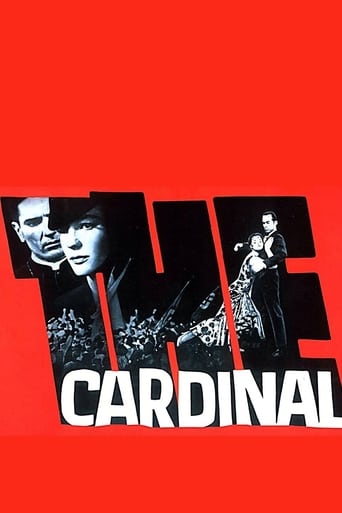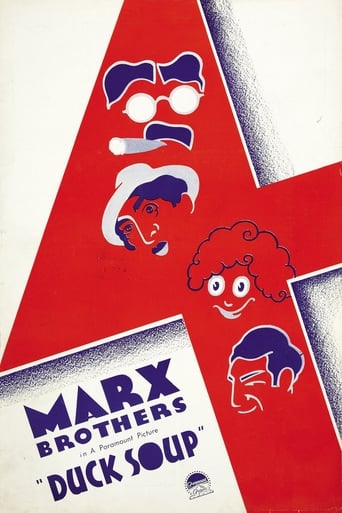Tea with Mussolini (1999)
In 1930s fascist Italy, adolescent Luca just lost his mother. His father, a callous businessman, sends him to be taken care of by British expatriate Mary Wallace. Mary and her cultured friends - including artist Arabella, young widow Elsa, and archaeologist Georgie - keep a watchful eye over the boy. But the women's cultivated lives take a dramatic turn when Allied forces declare war on Mussolini.
Watch Trailer
Free Trial Channels
Cast


Similar titles
Reviews
How sad is this?
Good story, Not enough for a whole film
A bit overrated, but still an amazing film
I think this is a new genre that they're all sort of working their way through it and haven't got all the kinks worked out yet but it's a genre that works for me.
The Italian Anglophile Franco Zefferelli's endearing account of Englishness in 1930s/40s Italy is amongst his finest films. He co-wrote it with the English writer John Mortimer. It begins in Italy in 1935 at Elizabeth Barret Browning's grave - a symbol which bonds England and Italy. The English expatriates are represented by Judi Dench, Joan Plowright and a compelling Maggie Smith (winning the 1999 Bafta for Best Supporting Actress). Plowright is secretary to an Italian businessman who wants his young son Lucca to grow up to be a proper English gent - so Plowright teaches him Shakespeare and feeds him bacon and eggs. Then the rise of fascism means Lucca must be sent off to Austria. There follows a quite touching scene where the English ladies say goodbye by reciting the St Crispin Day's speech from Henry V at the railway station.The remainder of the drama follows the ladies' fortunes under the dictatorship of Mussolini. Smith's character, Lady Hester, is the widow of a former British ambassador, and does indeed take afternoon tea with Il Duce. The English ladies end up being in-turned but their Englishness remains defiant. During the Allied invasion of Italy, they are liberated by a Scottish regiment. Lady Hester declares: "The Germans and the Italians couldn't get rid of us, so there's no reason why we should surrender to the Scots."
Tea with Mussolini is a beautiful and strongly acted film, with the talented Franco Zeffirelli turning the camera onto his own life. The film drags slightly and some of the drama turns into a series of anecdotes. However, it looks gorgeous with the rich settings, lavish costumes and stunning cinematography, while the score is beautiful. The script is sophisticated and well written, and the direction is excellent. And then we are treated to really strong performances from Judi Dench, Joan Plowright, Maggie Smith, Lily Tomlin and Cher. So overall, while I wouldn't consider it perfect, it is beautiful and worthwhile. 8/10 Bethany Cox
This film is directed and co-authored by Franco Zeffirelli, and I couldn't resist speculating on how much of it was actually true, since it is said to be based on Zeffirelli's autobiography. However, true in part, true completely, in the end it doesn't really matter. What matters is the amazing ensemble acting by Maggie Smith, Cher, Joan Plowwright, Judi Dench and Lily Tomlin (listing them in the order of significance to the story) and the stunning beauty of Florence where the film is set. The director and photographer plainly love the city, matching the love for it of the characters. Maggie Smith as the widow of a former British ambassador, the character that actually has tea with Mussolini, is the dominant figure in the film. However, Cher, playing a wealthy American -- vulgar in the eyes of he British ladies -- who turns out to be a complex, philanthropic Jew who must be smuggled out of the country in the end; Joan Plowwright as a kind lady who takes in the bastard son of an Italian businessman and teaches him to be an English gentleman; Judi Dench as an eccentric artist whose passion is to preserve a renaissance fresco from the Nazis during the war, and Lily Tomlin as a lesbian American archaeologist all deliver sterling performances. Cher's performance is the most amazing -- she holds her own in formidable company -- but one expects, of course, to be dazzled by Maggie Smith, Joan Plowwright, Judi Dench and even by Lily Tomlin. It's a sentimental, even melodramatic, tale, but see it for the ensemble acting. I can't think of another film that equals Tea with Mussolini in that respect.
I have rather mixed feelings about this one. The movie features beautiful Tuscan scenery, a background steeped in Florentine art treasures, appropriate period costumes, a dramatic wartime Italian setting, competent acting, and a sentimental personal story. However, for some reason it failed to live up to my expectations when I tuned in.The film depicts the semi biographical childhood tale of Italian director Franco Zeffirelli. Luca, the illegitimate son of a businessman disinterested in his offspring, is raised by his father's secretary and a group of British expatriot ladies living in pre fascist World War II Italy. These ladies enjoy idle days chit chatting, admiring the art of the old masters, and taking their four o'clock high tea at the Uffizzi, oblivious to the political and military storms brewing all around them. The women, all well past their prime, have come to genuinely love Luca, who progresses from a young boy to a teenager during the story. The Scorpionini, as these ladies come to be called for their biting tongues, prove to be quite naive, believing their safety to be guaranteed after tea is arranged with dictator Benito Mussolini. However, the British are eventually sent to Siena where they must live in close quarters and are more or less held as prisoners of war. These dames all have very disparate personalities, well portrayed by competent actresses. The group's leader is Lady Hester, Maggie Smith in her typical role as an insufferably snobbish English aristocrat. She constantly reminds the others that she is the wife of the former British ambassador to Italy, and she's the one who has in fact orchestrated the tea party with Il Duce hoping to ensure protection for these Britsh expatriots. Joan Plowright is Luca's chief guardian, Mary Wallace, the kind, grandmotherly secretary who has taken the young boy under her wing. Judi Dench portrays a free spirited artist (Arabella) and Lily Tomlin an American archaeologist (Georgie). As another noted, unnecessarily much is made of the fact that Georgie is a lesbian. For me, the star actress may actually be Cher, who plays a rich, independent, strong willed American Jewish widow named Elsa, who befriends these Britiah ladies while traveling about Europe seeking fine art and good times. Unfortunately this flamboyant character has a handsome but conniving Italian lover who ends up placing her in danger of execution.The women's bond with the orphaned Luca proves the most touching aspect of this tale. The movie does also depict how the genteel English ladies band with a pair of independent, modern American women to solve their wartime dilemmas. However, much of the time the dames are bickering and often seem just plain silly. I suppose that's intended as the point of the movie but a little of it went a long way, leaving me with something of a sense of disappointment in a story I had expected to love. It just wasn't quite the refreshing cup of tea I had anticipated.

